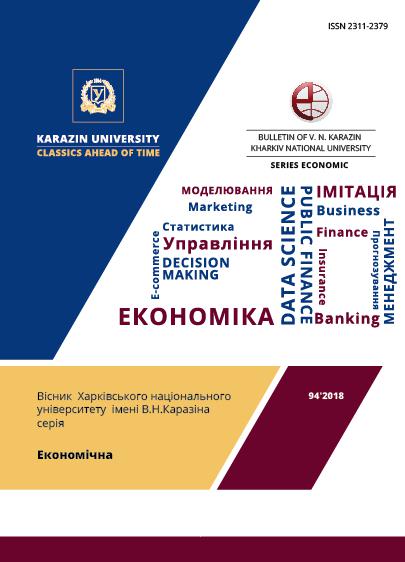Trust and socio-economic indicators: model including religion factor
Abstract
The article is concerned with the following issues: definitions, indicators of trust were reviewed; the working hypotheses of the research were formed; the choice of factors related to the trust indices was made; cluster analysis of the relationship between individual trust indices and economic indicators was carried out; a correlation analysis of the relationship between individual trust indices and socio-cultural indicators was conducted; a neural network for modeling the general index of trust based on a well-founded set of economic and socio-cultural indicators was developed.
The hypothesis about the influence of socio-cultural factors on trust and out of which there was distinguished a relation to a specific religion. By means of correlation analysis and neural networks, it was shown that Protestantism and Catholicism are the most significant religions that affect the general index of interpersonal trust. However, atheism has a more significant impact.
Following 198 observations, each of which represented the country for a given year in the period from 1995 to 2014, the neural network produced satisfactory results in forecasting the total trust index on the basis of the following factors: GDP per capita, GINI coefficient, atheism (percentage of population, support such an attitude to religion). The neural network recognized 89.9% of the data and 90% of the test set indicating that the network got adjusted and could be used for modeling. The scatter diagram for a 5% error indicates that most of the data is within the required value. But it should be noted, that the model overestimates trust in Ukraine at the end of the analyzed period. This gives grounds for the assumption that in Ukraine there are additional factors that negatively affect interpersonal trust.
Downloads
References
Alesina, A., and E. La Ferrara, “The Determinants of Trust,” NBER working paper 7621, 2000.
Cook K.S.,Yamagishi T., Cheshire C., Cooper R., Matsuda M., and Mashima R., “Trust building via risk taking: A cross-societal experiment”. Social Psychol. Quart. 2005, 2, 68, 121–142.
Меркулова Т.В. “Экспериментальный и социологический методы измерения доверия” Наукові праці Донецького національного технічного університету. Сер. : Економічна. № 1, 2014, 139-148.
OECD, “Trust”, in Society at a Glance 2011: OECD Social Indicators, OECD Publishing, 2011.
Bjornskov, C., “The Multiple Facets of Social Capital,” European Journal of Political Economy, 2006, 22(1), 22-40.
Glaeser, E., D. Laibson, J. Scheinkman, and Christine Soutter, “Measuring Trust,” Quarterly Journal of Economics, 2000, 115(3), 811-846.
Рівень довіри [Електронний ресурс]: сховище даних. - Режим доступу: http://www.worldvaluessurvey.org/wvs.jsp, вільний.
Рівень довіри [Електронний ресурс]: сховище даних. - Режим доступу: http://www.europeansocialsurvey.org/, вільний.
Рівень навчання [Електронний ресурс]: сховище даних. - Режим доступу: http://www.worldvaluessurvey.org/wvs.jsp, вільний.
GINI data [Електронний ресурс]: сховище даних. - Режим доступу: http://ourworldindata.org/data/growth-and-distribution-of-prosperity/income-inequality/, вільний.
GINI data [Електронний ресурс]: сховище даних. - Режим доступу: http://utip.gov.utexas.edu/data.html, вільний.
GINI data [Електронний ресурс]: сховище даних. - Режим доступу: http://data.worldbank.org/indicator/SI.POV.GINI, вільний.
GDP per capita data [Електронний ресурс]: сховище даних. - Режим доступу: http://data.worldbank.org/indicator/NY.GDP.PCAP.PP.CD, вільний
GDP per capita data [Електронний ресурс]: сховище даних. - Режим доступу: http://www.tradingeconomics.com/, вільний.
Сховище даних [Електронний ресурс]: сховище даних. - Режим доступу: http://econ.worldbank.org/WBSITE/EXTERNAL/EXTDEC/EXTRESEARCH/0,,contentMDK:20699070~pagePK:64214825~piPK:64214943~theSitePK:469382,00.html, вільний.
Рівень довіри [Електронний ресурс]:. - Режим доступу: https://ourworldindata.org/trust#data-quality-measurement , вільний.
Cox, James C. and Deck, Cary A., On the Nature of Reciprocal Motives. Economic Inquiry, Vol. 43, Issue 3, pp. 623-635, 2005. Available at SSRN: https://ssrn.com/abstract=906257.
Institutional economics / red.A.Oleynik. – M.: INFRA-M, 2005. – 704.
Putman, R. (2000). Bowling Alone: The Collapse and Revival of American Community. New York: Simon and Schuster.; Uslaner, E.M. (2000). Producing and Consuming Trust. Political Science Quartely 115(4):569-90; Delhey, J. & Newton, K. (2003). Who Trusts? The Origins of Social in Seven Societies. European Societies 5(2):93-137.

